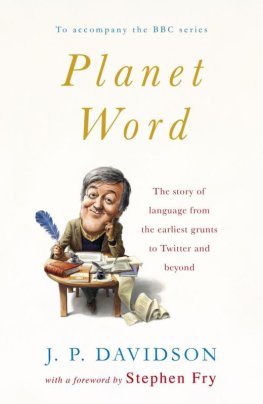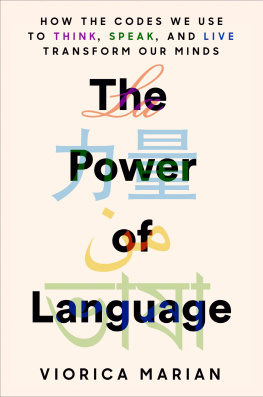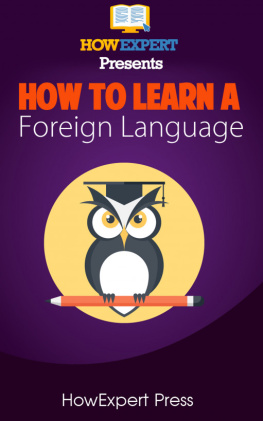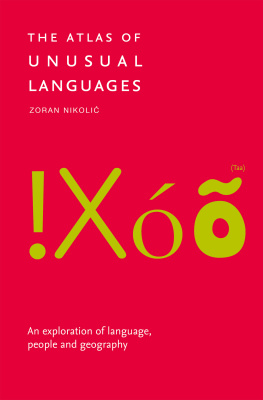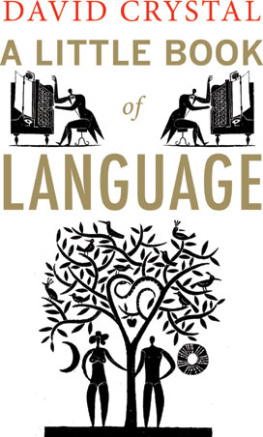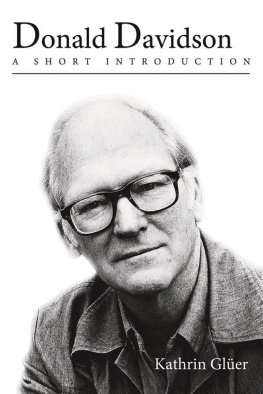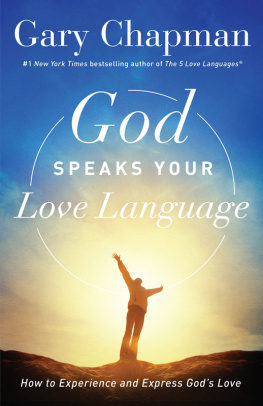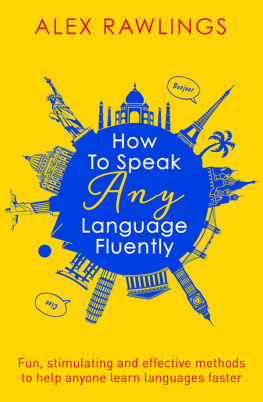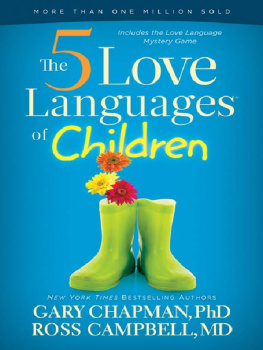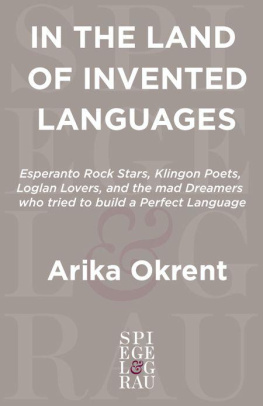
J. P. Davidson
With a Foreword by Stephen Fry
Planet Word
La parole humaine est comme un chaudron fl o nous battons des mlodies faire danser les ours, quand on voudrait attendrir les toiles.
(Human language is like a cracked kettle on which we beat out tunes to make bears dance when what we really want is to move the stars.)
Gustave Flaubert, Madame Bovary (1857)
Words are all we have. Certainly, reader, words are all we have, you and I, as you sit with this book or reading device in front of you and I sit and tap at my keyboard. You have no idea where I am as I do this, and I have no idea who, where or what you are as you continue to read. We are connected by a filament of language that stretches from somewhere inside my brain to somewhere inside yours. There are so many cognitive and cerebral processes involved simply in the act of my writing and your reading these words that not all the massed ranks of biology, genetics, linguistics, neurology, computational science or philosophy can properly describe, let alone understand or explain, how it all works.
Yet language, as we are all aware, is a human birthright. It is as free and available to us all as the ability to walk. The impairment, trauma, abuse or psychological impediment must be very severe indeed for any child in the world not to be able acquire their language with no more effort (and usually less pain) than they acquire their teeth.
Language has delighted, enthralled and enraptured me since I can remember. I sometimes imagine that I have been granted by nature a greater awareness and higher sense of language as compensation for my appalling deficiencies in music, mathematics and all things athletic. Musical athletes who speak and write well are a sore aggravation to me, as you might imagine.
From the earliest age I played with language as others played with toy cars and guns. Constant repeating, altering, distorting, rhyming, punning, inventing and vamping with words was as natural to me (and doubtless as irritating to others) as sniffing lampposts is to dogs or air-guitaring and football was to normal boys.
Language was my way of both getting me into trouble and getting me out of it. To learn a new word was to make a new friend, twee as that may sound. I was a verbal dandy, unquestionably, but the diffusion of pleasure that spread through me as I learned and thereby possessed new words was real and impossibly thrilling. I can still see in my minds eye the actual positioning of certain words on the pages of the Concise Oxford Dictionary that was my constant companion from the age of eight to eighteen. Words like prolix, strobile, banausic and pleonasm. Intolerable show-off that I was, I peacocked them at every opportunity, but they mattered to me. This ownership of new words, coupled with the tracing back of their lineage, etymology as I learned to call it, gripped me entirely.
Did you know, I would ask a bored friend, that the word sycophant originally meant someone who showed figs? and the bored friend would say Wow in that way that people do when what they really mean is I wish you would fall into a coma for ever.
It struck me from an early age, and the belief has never left me, that language is not celebrated enough. As a study, linguistics has flourished (despite being bogged down for so long in the rather arid schism of Chomskyites versus Whorfians, of which more later), splitting into psycho-, neuro- and socio-crossbreeds that have a presence at most serious universities; crosswords and language games like Boggle and Scrabble thrive more than ever; discussions about correct use and the dumbing down of language still take up a disproportionate amount of readers letters space in the newspapers all this is certainly true, but how rarely do people play or perform with their nature-given power of utterance in the way they might play or perform with music by dancing in clubs and at festivals, by walking everywhere with tunes in their ears and by whistling and humming as they shower? Even people who cant draw can doodle. But how often do we doodle with language? I do it all the time. If you were to plant a recording device in my living quarters, you would think me insane as I verbally nonsensed my way around the flat. Perhaps my plea for playfulness with language is a plea for me to be thought more normal, but it seems to me that language should be the last of all human attributes to be taken for granted.
What I am saying, I suppose, is that with this astonishing resource readily available and costing no more than breath or finger-tapping to produce, why is it that most people are so dull and unadventurous in their use of it? Why dont they delight themselves with new yokings and phrases, new rhythms and coinings, new pronunciations and abbreviations?
Well, one answer is that collectively they do. All the time. Especially when young. Most juvenescent sodalities (two others words I learned early and overused embarrassingly), most social groupings of young people, have their own private language, catchphrases and nicknames for people and processes. But language (especially English perhaps) presents a problem. Embarrassment, shame, a sense of inferiority, unfashionable regionality, gender, sexuality, age, education all these dreadful bugaboos come into play whenever we exchange language outside our, for want of a better phrase, peer group and we lose confidence in the creative side of our linguistic selves for fear of the negative judgements and snobbish contempt of the mainstream, just as we might one day lose our piercings and the coloured streaks in our hair.
All that bright individual verbal clothing is put away for the workplace and dull, pretentious verbal suits are worn in their place. Never was the word suit less well suitable. The memos, meetings and conferences of the workplace are couched in agglomerations of phrases as soulless, bloodless, styleless and depressing as the grey carpets, strip lighting and hessian partitions that constitute their physical environment. Sick-building syndrome is now well understood, sick language syndrome perhaps less so.
But this is to talk about language within language within a language. When I told friends that I was off to make a series of films about language for the BBC, the most common response was Which languages? and I became used to having to explain that I meant programmes looking at Language with a capital L, which must of course include individual languages, but would hope to look at the nature of the phenomenon, the achievement, the gift of language itself. Where it comes from, how it split into the 6,000 world tongues we now have and why some of these are disappearing by the hundreds every year; how language is acquired in each human individual; how it is used for persuasion, tyranny, solace, art and commerce; how or if the nature of one tongue influences, defines or circumscribes the actual thought of its user; how we respond to its transgressive deployment in blasphemy, obscenity and other offensive usages so many questions, so many areas of interest, such an endlessly fascinating and elusive subject.
This book reflects the major quests that I and J. P. Davidson, its author, who was also the producer of the series and directed three of the programmes, set out on. Over the course of six months or so, we and Helen Williamson, who directed the other two episodes, travelled the globe in search of all kinds of answers. None of us is able to say, any more than the most gifted and informed linguist can, whether English will be the dominant world tongue that it is today in a hundred years time. We cannot predict the future trajectories of Mandarin, Arabic or Spanish. Warfare, famine, technology, trade and natural disasters have all played and will continue to play their decisive parts in linguistic dissemination and desiccation and the individual has yet to be born who can successfully predict the momentous upheavals in human affairs that drive people and their languages in new directions. Neither can we predict the new influences that will be brought to bear within individual languages. Who knew, just ten years ago, of OMG, lulz and retweeting? Nor can we know what words will be offensive to generations yet unborn. I can write the word fuck now in the more or less certain knowledge that only an odd few (and I do mean
Next page
